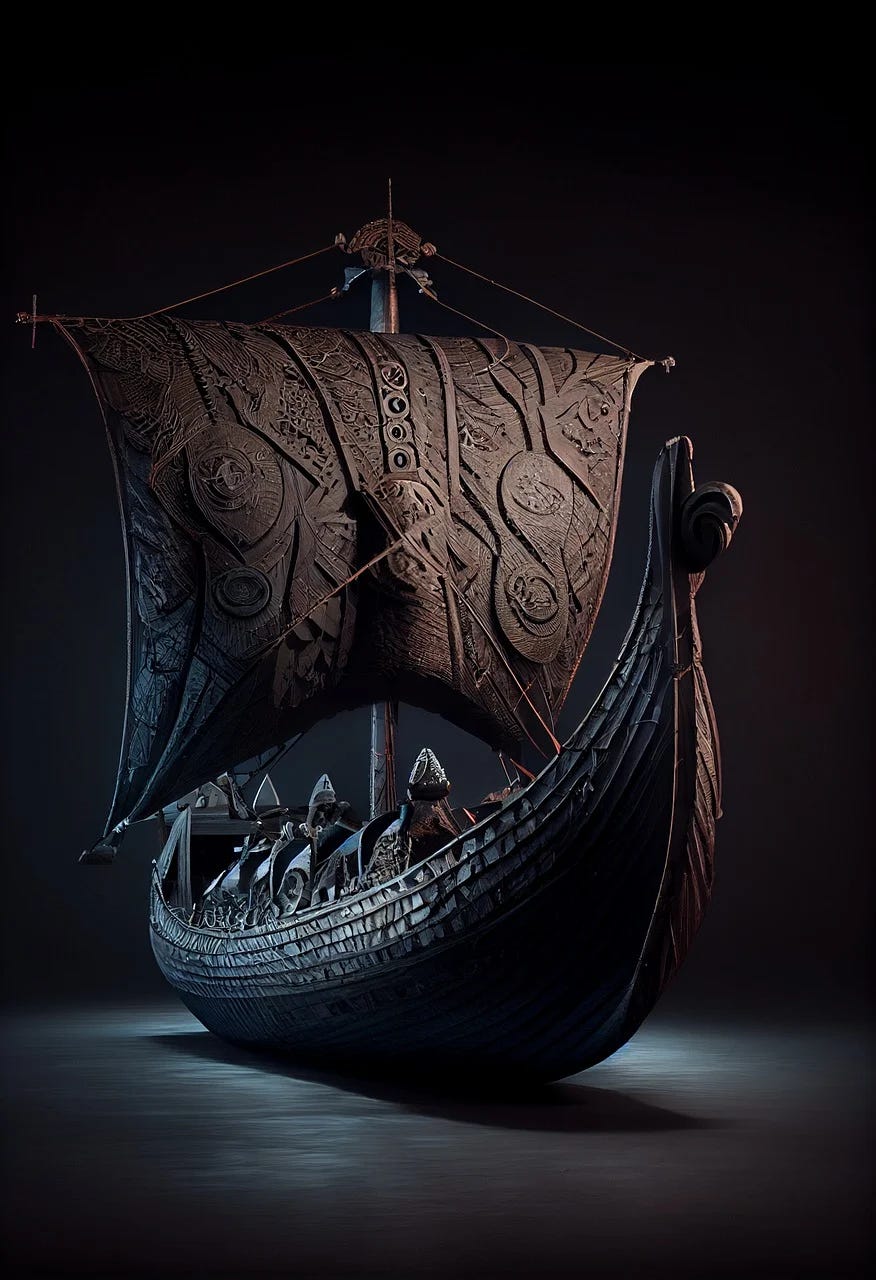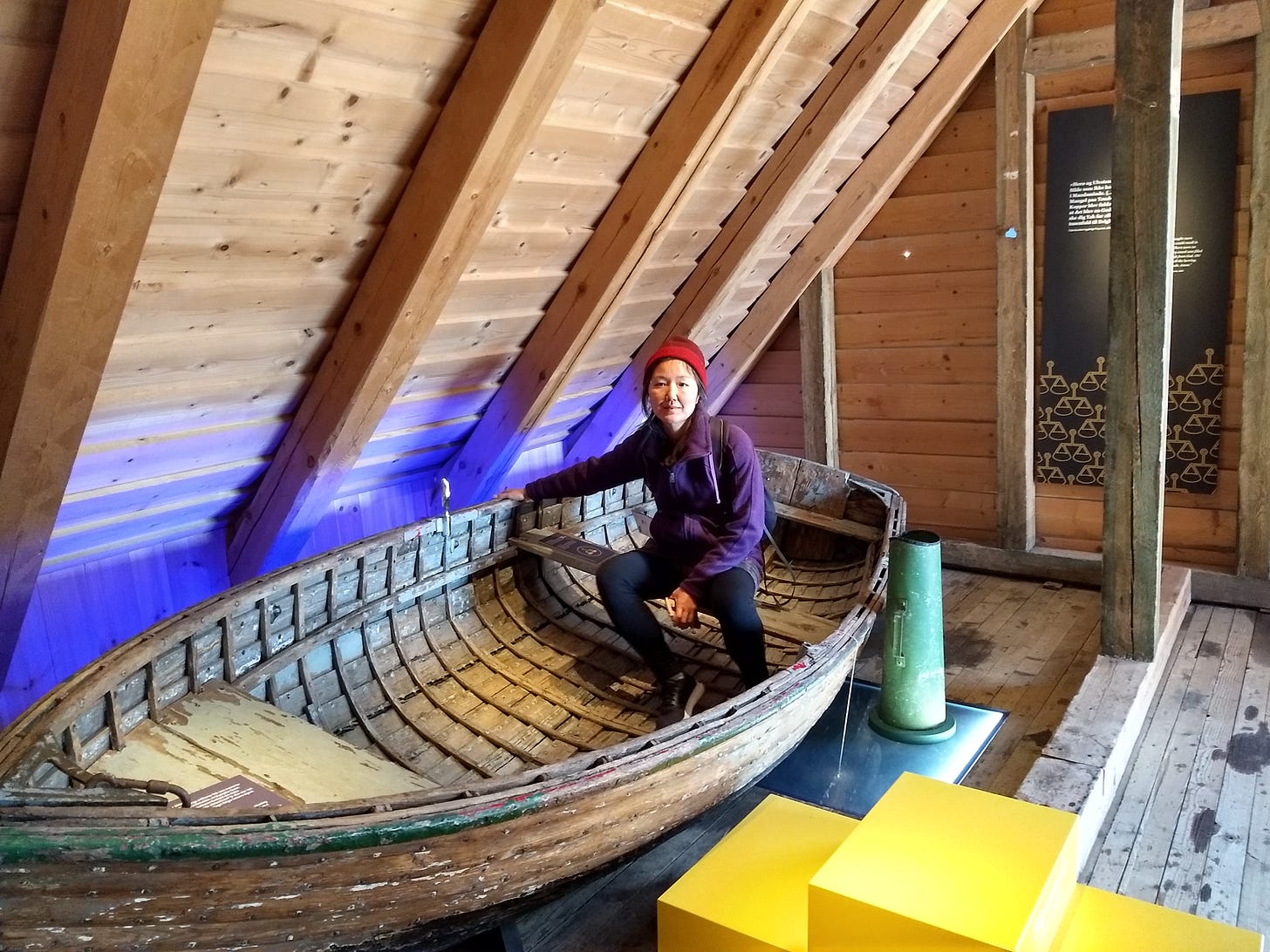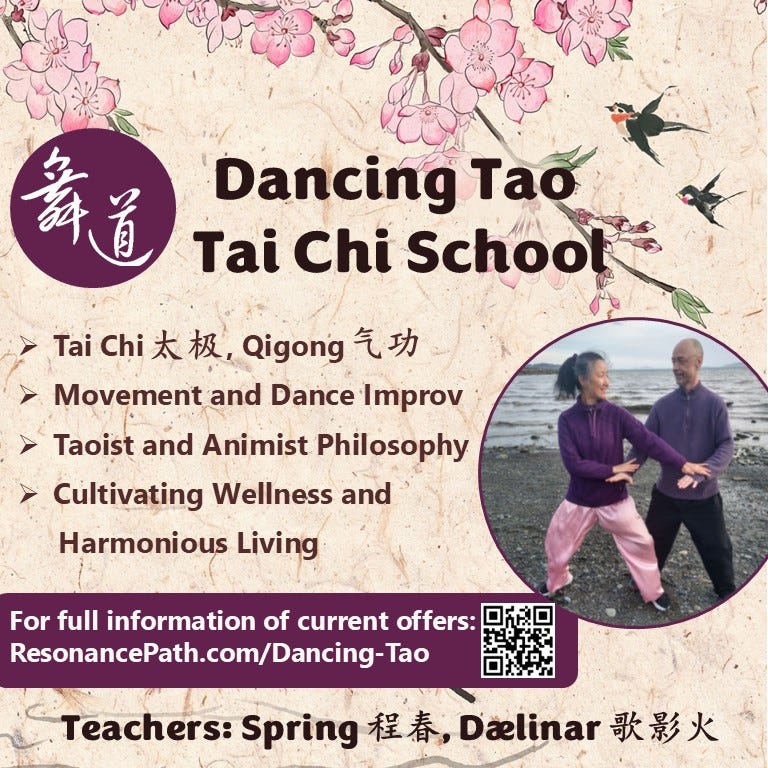Becoming the Ocean That We Love
When the Ancestral Spirit of Ancient Chinese philosophers Meet 19th-Century Norwegian Fishermen
To my surprise, being in the museum, I found myself appreciating the Norwegian fishermen’s spirit of exploration and their trust in the infinite. I began to wonder a different question, “how do we honor and embody this spirit that trusts and explores infinite abundance while upholding ethical responsibility for sustainable practices?” This question released a powerful wave of healing in my body, as it guided me toward integration, unity and creativity, instead of focusing solely on resistance on “fighting against”.
Tending the relationship of reciprocity is not just about treating the ocean, forests, and rivers as inanimate objects, measurable quantities and data, or passive resources to "manage." It is also about relating to them as animated beings with their own will, desires, feelings and evolutionary purposes.
Meeting the Spirit of Explorer in a Norwegian Fishing Museum
In 2019, my parents and I took a trip to Norway. In Oslo, we visited a museum dedicated to the early fishing industry. The Norwegian people are renowned seafarers who have pioneered sea travel and the overseas fishing industry. One of the quotes from the late 19th century expressed this sentiment, "There is an infinite number of fish in the ocean. All we need to do is build bigger boats and more powerful equipment, as we can never exhaust this pool of resources."
Of course, today we know that this belief was not true. In just about one hundred years, the fishing industry has brought many species of fish in the ocean to the brink of exhaustion.
I was amazed by the quote; it felt deeply jarring to my intuitive sensibility. Forty years ago, when I was a young girl, I experienced the onset of industrialization unfolding in China, a country of over one billion people. Even then, without access to scientific data, I intuited the ecological collapse and inevitable climate change—both of which happened much faster than I had anticipated.
At the same time, visiting the museum gave me a visceral sense of these 19th-century fishermen who genuinely believed in the inexhaustibility of ocean resources and lived their lives testing that belief. Touching the tools they made and the ships they built, I was struck by the workmanship and devotion they poured into their craft. Imagining the hardship they faced on the unforgiving sea and the ingenuity they harnessed dissolved some of the judgment and "othering" I have carried in my heart for forty years.
As a young girl in China, the grief and pain of feeling ecological collapse were immense and devastating. Judging “others” became a way to protect my heart so I can survive. This judgment and "othering" were heavy burdens I carried for much of my life, directed against the modern, extractive social enterprise initiated primarily by Europeans.
I don’t regret carrying that judgment as it propelled me to fight against the oppression so I can discover my own voice. Nevertheless, fighting-against, by itself, does not lead to unity and healing I desire. Moreover, it is not a sustainable practice for the fighter herself.
It was when I stood in the museum, I heard a new, gentle voice in my heart whispering, “We are all human, each with an imperfect understanding of life and the universe. So is Chinese ancestry knowledge and my current understanding of life and the world.” With that voice, I felt the wall of judgment melting.
Since industrialization, we have built our civilization and social infrastructure on unsustainable practices that have damaged ecological systems and exhausted natural resources. Yet, as humans, we intrinsically harbor a spirit that taps into the infinite abundance of the universe. My heart told me that Earth and the cosmos wants this spirit to be seen, embodied and embraced too.
To my surprise, being in the museum, I found myself appreciating the Norwegian fishermen’s spirit of exploration and their trust in the infinite. I began to wonder a different question, “how do we honor and embody this spirit that trusts and explores infinite abundance while upholding ethical responsibility for sustainable practices?”
This question released a powerful wave of healing in my body, as it guided me toward integration, unity and creativity, instead of focusing solely on resistance or “fighting against”.
In the museum of Norwegian Fishermen, I was surprised to see part of myself reflected in these fishermen. I, too, have this explorer spirit that believes in infinite possibilities. This spirit has taken me on a cross-continental journey from China to the U.S., embarking on expeditions to the high mountains of the Himalayas, scaling rock walls in remote alpine countries, and navigating diverse professional fields such as science, healing, music, philosophy, leadership development and organizational consultancy. Before I arrived at Norway, I just published my first English book The Resonance Code - Empowering Leaders to Evolve Toward Wholeness and attended a conference on Climate Change and Consciousness in Scotland.
These fishermen and myself are both explorers of the unknown territory, except in different dimensions. The fisherman explores the ocean. I am an explorer of the “ocean” of consciousness and “islands” of cultural paradigms.
The Tao: Navigational System for the Unknown
Throughout my “cultural expedition”, the navigational system I rely on is the wisdom traditions rooted in my cultural heritage: Chinese medicine and the philosophy and practices of the Tao. As a Taoist practitioner, my purpose is to nurture harmony and balances between different forces and to alchemize the tensions between polarities into creativity and regenerative power.
Practices like Qigong and Tai Chi teach me what harmony and balance feel like in an embodied sense. With this honed sensibility, I can begin to harmonize the Yang—the expansive, adventure-seeking spirit of explorers—with the Yin—the heart and soul that perceives the world through cycles of reciprocity.
If we take from the ocean, we also need to give back by nurturing its regeneration with care. By tending to this relationship of reciprocity, we can re-learn how to become ethical stewards of nature’s infinite abundance.
Tending the relationship of reciprocity is not just about treating the ocean, forests, and rivers as inanimate objects, measurable quantities and data, or passive resources to "manage." It is also about relating to them as animated beings with their own will, desires, feelings and evolutionary purposes.
Without this perspective, even our best efforts at “environmental management” can unconsciously project human desires, needs and metrics of measurement onto nature.
Many indigenous teachings around the world emphasize awakening the felt-sense memory that we are an integral part of the ecological system, just as ants, mushrooms, grass, and spiders are part of the ecology. Our bodies are not merely an aggregation of bones, muscles, tendons, and neurons; they are the physical anchor of subtler energetic system that extends beyond the physical mass. This energy system of our body resonates with the ocean, the forest, the lava, the mountains, and the rocks. When we tend to this part of our being, we may reclaim our membership as an element of the ecological system.
One Chinese saying said, if you want to understand leopard, you need to become a leopard. 想要了解豹子,需要成为豹子. If we want to understand how the ocean regenerates herself and sustains her infinite abundances, we need to become the ocean.
Become the Ocean We Love
Qigong and Tai Chi have taught me how to become the ocean I love. Through these practices, I tend this part of my being that naturally resonates with natural elements. These practices slow down my awareness, synchronize my breath with movement, and nurture the reciprocal relationship between parts of my body and the whole. They teach me to fully inhabit my physical body and respect its autonomy.
In Qigong, we do not force or will our bodies to produce specific results, like becoming faster or stronger. In my Tai Chi practice, it’s also not even about “performing the right forms”. Instead, we practice the forms to allow our body to restore its alignment and awaken its own autonomy. We cultivate an awareness of gravity, which is being experienced as a spiritual force that connects us to Earth Mother. We also cultivate an awareness of "levity," a subtle energetic force that can be felt through dedicated practice. Each gesture and movement, simple as they may seem, carries meaning. These acts of embodied communication bridge our energy with the subtle, energetic web that surrounds us.
During my time visiting Norway, I felt the ocean and the Norwegian ancestors speaking to me. One year later, I moved to Bellingham during COVID. Since then, I met many people of Norwegian ancestry who have since become close friends and collaborators. My collaborator Daelinar is one of them. Together, we co-founded the Dancing Tao Tai Chi school. I like to think that our ancestors are guiding us to come together and collaborate, forging a new pathway to bring our respective ancestry knowledge into an integrated whole.
Below are videos Daelinar and I co-produced for the Dancing Tao workshop we will lead on Jan 4 in Bellingham Washington.






Spring both the essay and the the videos were so imbued with the spirit of the Tao. How very wonderful of see the many seeds yo’ve planted and cultivated for so long flourishing in Belllingham.would that i could join you in person in the t’ai Chi/Qi Gong classes. Your form has become more beautiful as have you.